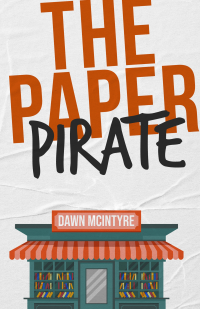Genre:
Mystery- Country: United States
- Books: 1
- Profession: Estimator
- Born: 4 March
- Member Since: Apr 2023
- Profile Views: 4,106
- Followers: 59
- VISIT AUTHOR: Website, Facebook, Instagram, Amazon, YouTube,
Dawn McIntyre is a New Jersey native and long-time resident of rural Pennsylvania. After years of remodeling houses and working in corporate America, she began devoting more time to her true passion–building with words. The result, so far, has been a portfolio of short stories and novels.
McIntyre founded, along with two fellow authors, a writers’ workshop in 2013. She continues to write fiction peopled by richly nuanced characters in deceptively simple, familiar settings.
Dawn McIntyre's Books
Stay in the loop on books by Dawn McIntyre. See upcoming and best-selling books by the author here. You'll also find the deals on books by Dawn McIntyre.
** Please note that the information or price displayed here may not be the updated. Make sure to double-check the latest book price before buying books.
** Also, there might be other books by Dawn McIntyre not listed on AllAuthor.
| Book |
|---|
Dawn McIntyre Interview On 14, Aug 2023
 "Hailing from the picturesque landscapes of New Jersey, Dawn McIntyre is more than just an author; she is a storyteller who weaves intricate tapestries of emotion, human experience, and imagination. In 2013, alongside two kindred literary spirits, McIntyre embarked on a remarkable endeavor by founding a writers' workshop. Her stories resonate deeply, urging readers to introspect and connect with the characters and themes she skillfully brings to life."
"Hailing from the picturesque landscapes of New Jersey, Dawn McIntyre is more than just an author; she is a storyteller who weaves intricate tapestries of emotion, human experience, and imagination. In 2013, alongside two kindred literary spirits, McIntyre embarked on a remarkable endeavor by founding a writers' workshop. Her stories resonate deeply, urging readers to introspect and connect with the characters and themes she skillfully brings to life."
I was born in Paterson, NJ. I had daydreams about various careers, as most kids do, but a creative writing class in my Freshman year of HS started what has become a lifelong interest in writing fiction.
Can you tell us about your journey from remodeling houses and working in corporate America to becoming a writer? What inspired you to shift your focus towards writing?I am still employed at my day job, a technical position as an estimator for a manufacturer of plastic products. Writing is a side-hustle for me, but gives me a great deal of satisfaction. I have been writing for decades but have done most of my work in the years since turning fifty. Not sure why, but a friend suggests that the longer we live, the better we come to know people and how they behave—characters as well as real folks.
How does your background as a New Jersey native and long-time resident of rural Pennsylvania influence your writing? Do you draw upon your personal experiences and surroundings for your stories?Although my latest novel, The Paper Pirate, is set in a small NE Pennsylvania town similar to one close to my present home, the locations used in most of my novels and short stories aren’t clearly identified. I’d like the reader to feel like they might be happening in his/her own hometown. I avoid basing characters on people I actually know and I also don’t insert myself into my stories, as some authors do.
You mentioned that you build with words. Could you elaborate on your writing process? How do you approach crafting your short stories and novels?Plotting is the hardest part of writing for me, so I have come to value outlining. I use an informal technique that allows for flexibility, but I stick to the plan. Without it, I find I write dozens of pages that veer off on tangents and don’t wind up in the story anyway. I have less time for writing than I would like and I can’t afford to waste it.
Your stories are described as having richly nuanced characters in deceptively simple, familiar settings. How do you ensure that your characters are well-developed and relatable to your readers?Before I begin the first draft of a story I like to jot down fairly detailed character bios that allow me to really get to know the fictional people well enough that I know what they would do in the various situations we’re going to face together. Much of the info in these character histories are for my eyes only, but they make me comfortable with the characters and, at times, even provide ideas for subplots.
Tell us about the writers' workshop you founded with your fellow authors in 2013. What motivated you to start this workshop, and what impact has it had on your writing journey?For several years, I belonged to a writers’ workshop run by a local arts’ alliance. I found the critique and camaraderie very helpful. When the organization ended the writers’ group, I suggested to two fellow authors that we start our own. September 2023 will be our ten-year anniversary. Members have come and gone but the core group remains. One of the best things about the workshop is the need to write something—anything—to present at the meetings. It keeps us going through writing slumps and, I think, motivates us to write better stories.
Writing fiction requires creativity and imagination. How do you keep your creative juices flowing and maintain inspiration for new story ideas? Sometimes, not very well!If I’m not feeling inspired by anything I sometimes read through old notes. Doing so recently allowed me to complete a short story I’d started years ago. Sometimes a little snip of a dream that I’m lucky enough to remember will provide an idea for a story. Right now, I’m mostly finished with another cozy-crime novel, with no idea what kind of polishing it needs to bring it to life. We’ll see what happens.
What are some of the challenges you've faced as a writer, and how have you overcome them?My greatest challenge is carving out time to write. My day job is demanding and stressful and takes up a great deal of my time. Another challenge is that I’m simply not a prolific writer. Even if I won the lottery and could spend eight hours a day, five days a week writing, I simply couldn’t come up with the impressive number of stories that some authors produce. I guess I have to go for quality over quantity, LOL.
Can you share some insight into your writing routine? Do you have any specific rituals or habits that help you stay focused and productive?I work long hours, five days a week, and I would be dishonest if I said I was able to set aside a portion of each day for writing. I wish I could, but I can’t. I write mostly on the weekends, and, if I have strong inspiration, I will try for an hour or so in the evenings. Lacking that, I don’t push myself to write after an exhausting day. Nothing good usually comes of it.
Many aspiring writers struggle with finding their unique voice and style. How did you discover your writing voice, and what advice do you have for writers trying to find their own?For an author, finding one’s voice takes time and practice and patience. It evolves over time and can’t be rushed. I’d advise aspiring authors to play around with the styles of authors they admire, in order to see what feels comfortable. When something clicks, stick with it and develop it until you find your groove.
As an author, you likely receive feedback and reviews on your work. How do you handle criticism, and what role does it play in shaping your future writing?I value thoughtful critique, especially from other authors but also from readers who do not write. I like knowing what resonated with readers and what did not. I don’t mind it when someone says my book just wasn’t to their taste, but I don’t like seeing an author’s work trashed by someone who seems more interested in pulling down a book’s rating than in offering a helpful opinion. My advice: if you really hate a book, simply stop reading it, find one that you love, and let it go at that.
Is there a particular theme or message that you often explore in your book, The Paper Pirate? If so, what draws you to this theme, and why is it important to you?One theme is a love of books and brick-and-mortar bookstores. There’s also a theme of friendship between the ensemble cast of characters, all of whom are middle-aged or seniors, which I guess can be considered a third. These are important to me because I also love books and bookshops, and because I’d like to give readers of this age group a chance to see characters similar to themselves in action, rather than sitting back and watching the younger characters solve the mysteries and save the day.
Building a portfolio of short stories and novels is an impressive accomplishment. What can readers expect from your stories? Are there any recurring elements or themes that tie your work together?I suppose a recurring theme is ordinary people being tossed out of their comfort zones and surprising themselves with how well they perform. The plots of my last two novels have revolved around books, bookstores, writing and reading. I feel like I want to explore this bibliomystery theme further.
What future projects are you currently working on, and what can we look forward to seeing from you in the coming months or years?My latest work-in-progress is a novel titled Buried in the Back Pages. In it, a book club witnesses the attempted murder of one of their members during a Zoom meeting. Later, they each shelter her as she tries to convince the police that a very unlikely suspect is trying to kill her.
What do you think of AllAuthor? Has this website been helpful to you?AllAuthor has been a great help to me. I’m happy with the exposure I have gained for a very affordable rate. I would (and I have) recommended you to other writers.
Ask Dawn McIntyre a Question
Have brimming questions to ask author Dawn McIntyre? Ask whatever you like, but keep it appropriate.
** Please note that unanswered questions will not appear on the page. Refrain from posting promotional messages.


